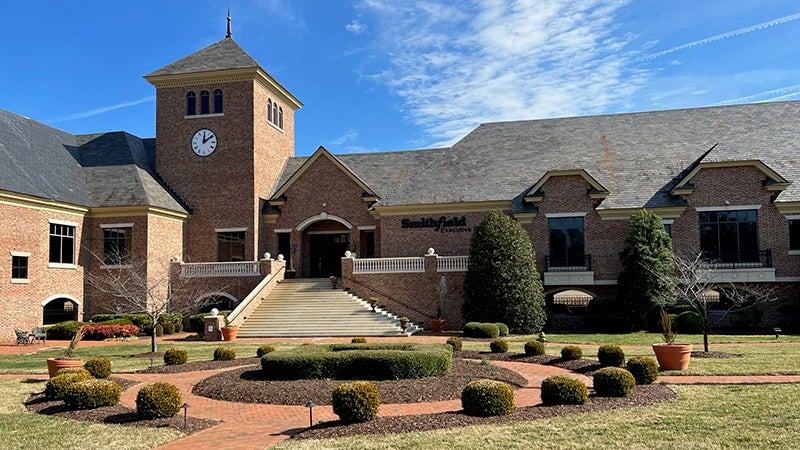Smithfield Foods supports ‘Grange’ plans
Published 5:34 pm Friday, June 9, 2023

- Smithfield Foods' global headquarters is on the banks of the Pagan River.
Smithfield Foods, the town’s anchor employer, is fully on board with developer Joseph Luter IV’s plans to build the Grange at 10Main, a company spokesman said.
An indoor/outdoor home for the Smithfield Farmers Market is to anchor the proposed 304-home development at Route 10 and Main Street, which would also include three- and four-story apartment buildings, a hotel, commercial space and single-family and duplex homes.
Luter IV, a former executive vice president of the meatpacking giant and the son of its former chairman, Joseph Luter III, asserted to members of Smithfield’s Planning Commission in April that the town had “lost over 400” Smithfield Foods jobs to neighboring cities “because we lacked” what’s proposed for the Grange.
“We would not be here today with this ambitious plan if we did not have the support of Smithfield Foods, Luter IV said, calling the global pork giant the “primary economic engine” for the town and Isle of Wight County.
“We do support the project, one that we believe is conducive to our company’s continued growth in our long-time hometown,” said Jim Monroe, vice president of corporate affairs at Smithfield Foods.
Monroe called Luter IV’s estimate of 400 lost jobs a “conservative number when you consider current Foods employees who work here but live in other locations outside of Smithifeld as well as job candidates who have declined roles due to the lack of local amenities.”
“We face an ongoing challenge of attracting employees, particularly younger professionals, who want to work and live in Smithfield,” Monroe added.
The hotel and “quality housing options,” Monroe said, will “help us recruit more effectively while providing more options for business partners who visit us on a regular basis.”
Luter IV had told the commissioners in April that the hotel, apartments and housing would fill “many of the current voids” in town, including “Class A housing, both for rent and for sale.”
“Class A,” in the real estate market, refers to the most expensive homes in the most desirable neighborhoods. According to a fiscal impact analysis by Ted Figura Consulting, which was last revised Feb. 5, the apartments would range in rent from $1,475 to $2,100 per month, and the houses would be sold at a $505,000 starting price.
While some downtown-area residents have voiced concerns that the price points may further gentrify Smithfield and price first-time homebuyers out of the market, Smithfield Foods is confident that “this project will make Smithfield an even more4 desirable place to live and work,” Monroe said.
“The Luter family has a long history of enhancing the town with great vision and philanthropy,” Monroe added, noting the proposed market “will further reinforce the town’s agricultural roots and destination as a food town.”
Luter III made a $5 million contribution toward the development of the town-owned Windsor Castle Park. Ten years earlier, in 1999, he offered $500,000 toward the building of a new Smithfield Little Theatre when Smithfield Foods sought to purchase and raze the converted cotton gin theatre on Commerce Street and build its corporate headquarters on the site. Donations by Luter III and a local bank, in conjunction with tax dollars, also funded the $4 million Joseph Luter Jr. Sports Complex, which opened in 2018 and is named for Luter III’s father.
Luter III has offered $1 million plus land for the market, conditioned on the town and county jointly putting up another $2.8 million, which each governing body voted to do last year. Luter IV told commissioners in April that he also plans to seek “reimbursement” for costs associated with the “public” portions of the development, but hasn’t disclosed a dollar amount.
Several members of the Planning Commission have said they would prefer to work with Luter IV over another developer when it comes to a plan for the nearly 57-acre Grange site that was formerly home to the now-demolished Little’s Supermarket and 1730s-era Pierceville farmhouse.





